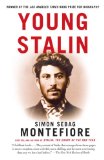Page 1 of 1
There is 1 reader review for Young Stalin
Write your own review!
Greg Cameron
An excellent, if tendentious, book
I experienced something of a split-screen reaction to Simon Sebag Montefiore's book "Young Stalin." First off, I would say that it is a provocative book that will change your view of one of history's great psychopaths forever. I am not in a scholarly position to judge the objective merits of his historical scholarship, but he appears to have done an excellent job of researching his topic. Stalin, to me, always seemed a curiously colourless psychopath who somehow aced his way into the lead position in a highly centralized political system.
In this book, we learn to our astonishment that Stalin was a poet (and not a bad one either, as Pasternak himself ironically believed), a womanizer (and even the occasional chicken hawk), a tireless worker,a wrestler, a bookworm (he satirically annotated his own editions of Tolstoy!) and a man with more political shrewdness than he is given credit for.
Stalin almost comes across here as a semi-romantic pirate figure in the Russian revolutionary movement (Khruschev supposedly said Stalin was fond of an old Hollywood film about a paranoid pirate who was systematically eliminating his fellow pirates and would often show it at the Kremlin to the ambivalent reaction of his sweating underlings - it sounds ridiculous enough to be true!).
Montefiore thinks Stalin's psychotic underpinnings were laid by a physically abused childhood and a childhood and adolescence spent in the violent world of Georgian youth gangs (and the generally violent culture of Georgia itself). (And also by a life spent in backstabbing conspiracy.) Social workery, perhaps, but it's a credible argument. Montefiore meticulously charts the rise of this psychopath to the top of the Communist party, noting his interactions with the likes of Lenin and Trostky. Montefiore asserts, as Vladimir Nabokov never ceased to tell Edmund Wilson, that Stalin was an expansion of the thuggery of Lenin's own regime and not a radical break with Leninist practice. Lenin's reliance on Stalin at many points in the history of the Soviet Communist Party is incontestable - Montefiore's documentation of this is beyond reproach.
On the whole, I find his argument here compelling. Montefiore's prose is lively and very readable - almost like an historical novel at times. With Stalin as the ultimate anti-hero, no less! Montefiore tries to explain Stalin's behaviour, but he does not absolve it. This book is perfectly splendid and I heartily recommend it. However, I have a strong reservation. Montefiore consistently uses the word 'terrorist' in connection with the Marxist-Leninist party in an almost bludgeon-like fashion. Montefiore would apparently have no use for the cliche about one man's terrorist being another man's freedom fighter. On the one hand, Montefiore, with this tactic, seems to want to connect the past with current affairs, perhaps in the hopes of stirring his readership's interest in increasingly remote historical material. On the other hand, he is perhaps suggesting some parallels between the Soviet Marxist-Leninist party and current affairs. In effect, instead of considering Islamofascists, he would have us consider Islamocommies. Oh, my. Granting that both sets of ideas have considerable totalitarian impulses, I don't find this argument (if indeed it constitutes an argument at all) convincing - in effect, he is, to my eye, mixing apples and oranges. Montefiore makes the connection explicit in at least one passage and he even drags out the tired saw of Marxism being a secular religion(George Steiner would have loved it!).
I think this whole line of thought fails to illuminate. Montefiore would be better off letting the facts speak for themselves, as out-of-fashion as this idea seems to be for some posturing intellectuals. Don't let these reservations keep you from buying or reading the book. This book will force you to revise your view of Stalin forever. It certainly did mine. I congratulate Montefiore on a job (by and large) well done. A lively and stimulating read.

 Book Reviewed by:
Book Reviewed by:





